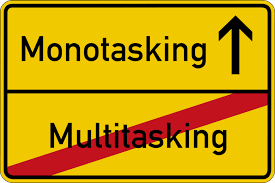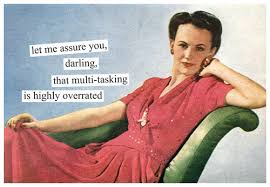There was a time when multitasking was considered to be an elite skill. The more tasks you could juggle at one time,  the more efficient you were considered to be.
the more efficient you were considered to be.
Now we know better. Not only does multitasking not work, it actually has a negative long term effect on our brain and it’s harming our health big time.
Studies show that when we attempt to multi-task, or complete several tasks at once, it actually lowers our IQ and literally shrinks the part of our brain responsible for empathy and emotional control. Multitasking can also lead to memory problems, increased chronic stress and it makes you less productive, among other things.
When we multitask we’re not actually completing several tasks at once, thereby shortening the time we need to work. We’re actually just rapidly switching back and forth between tasks, which divides our attention. Experts say this “task-splitting” causes up to a 40% decline in our productivity!
Even switching back and forth between things like texting and emails or cooking and listening to our kids is considered multitasking. Since there will be some multitasking we can’t control (anyone got a toddler?), the more we can develop a “monotasking” mindset whenever possible, the better.
 Monotasking is the practice of doing or completing just one task at a time before moving on to another. With monotasking a person would minimize interruptions and do their best to stay focused on just one task at a time.
Monotasking is the practice of doing or completing just one task at a time before moving on to another. With monotasking a person would minimize interruptions and do their best to stay focused on just one task at a time.
Here are 5 Tips to Help you Start Practicing Monotasking today:
(1) Choose a Big Task and Focus Solely on Completing it –
Every day set aside at least 60-90 minutes when you can focus on one single project or task without interruption – that means not checking email, your phone or social media even once. You may be surprised to find how quickly you complete this task when you’re not distracted. If you need to, put your phone on airplane mode and put it in another room so you’re not tempted.
(2) Figure out What Time of Day you Work Best – For most of us that will be first thing in the morning but others find they work most efficiently late at night. Figure out when you are your sharpest and use that time to complete some of your bigger tasks.
(3) Eliminate Distractions and Choose 2-3 Things that are Most Important – What are the 2-3 things you could do today that would have the biggest impact on your career or business? What else can you eliminate? Asking these questions forces you to choose what’s most important for that day and gives you permission to not try to “do it all”. You would only move on to other tasks after these ones are complete.
(4) Have a Plan for your Day – It’s important to know what your 2-3 biggest tasks are for the day, but you should also plan when you will do more mundane tasks like return phone calls, answer emails or complete paperwork. For example, instead of just answering emails all day long as they come in, set aside 2-3 times during the day when you will complete this task – say for example 8 am, 12 pm and 4 pm or 11 am and 6 pm. Decide how much time you will dedicate to answering emails at one time – let’s say it’s 30 minutes. Set a timer if you need to and stop when it goes off. YOU control your time, not the other way around – THIS is monotasking.
(5) Plan to Have Time Each Day to Not Work – After a certain point in the day, a person is no longer effective if they’re trying to fit in “one more thing”. Decide at what time in the day you will turn off your phone, walk away from your computer and either spend time with your kids, your significant other, friends or even just be alone. Exercise, do yoga, go for a walk, get into nature or just sit and read a book. Giving your brain a mental break allows you to be more productive and you’ll find yourself more refreshed the next day instead of exhausted.
they’re trying to fit in “one more thing”. Decide at what time in the day you will turn off your phone, walk away from your computer and either spend time with your kids, your significant other, friends or even just be alone. Exercise, do yoga, go for a walk, get into nature or just sit and read a book. Giving your brain a mental break allows you to be more productive and you’ll find yourself more refreshed the next day instead of exhausted.
Happy Monotasking!
